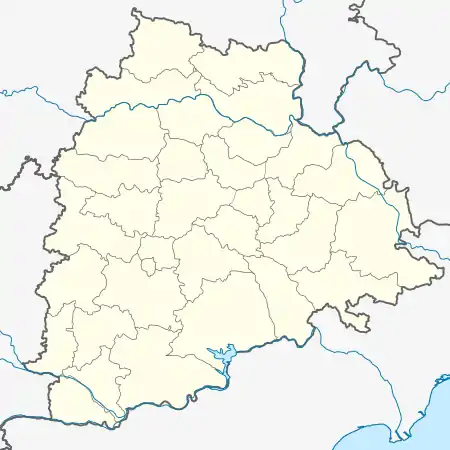Indian Institute of Chemical Technology
The Indian Institute of Chemical Technology is a national-level research center located in Hyderabad, Telangana, India under the Council of Scientific and Industrial Research (CSIR). IICT conducts research in basic and applied chemistry, biochemistry, bioinformatics, chemical engineering and provides science and technology inputs to the industrial and economic development of the country.[1] IICT has filed one of the maximum CSIR patents.[2][3][4]
 | |
| Type | Autonomous, Govt, CSIR |
|---|---|
| Established | 1944 |
| Director | Dr. S. Chandrasekhar |
| Address | Uppal Rd, IICT Colony, Tarnaka , Hyderabad , Telangana , India 500007 17.422114°N 78.539307°E |
| Campus | Urban Tarnaka 170 acres (690,000 m2) |
| Website | www |
 Location in Telangana  Indian Institute of Chemical Technology (India) | |
Activities
The research and development programmes of IICT relate to the development of technologies for pesticides, drugs, organic intermediates, fine chemicals, catalysts, polymers, organic coatings, use of low-grade coals, and value-added products from vegetable oils. Process design and mechanical engineering design form an integral part of technology development and transfer. IICT is also actively engaged in basic research in organic synthesis and catalyses.[5]
Public health
An example of the institute's work is development of technology for accurate identification, of principal mosquito vector in rural endemic areas for designing suitable control measures of vector-borne diseases like malaria, filaria, Japanese encephalitis, dengue fever, etc.[6]
In developing countries like India, classification and identification of the mosquito species from rural endemic areas are of paramount importance. The World Health Organization monograph which describes the taxonomic data in the form of a pictorial key is generally difficult to understand by a non-taxonomist. Keeping this difficulty in view, a novel software has been developed which is user-friendly and menu-driven. The package can be successfully used in mosquito control programs in rural areas. Rapid identification and greater accuracy are the salient features of the technology.[7][8]
References
- IICT licenses cancer patents to US co | Business Line
- Rediff On The NeT Business News: Hyderabad's IICT ties up with Cytomed Inc for 3 US patents, more JVs planned
- "01_Master_pages-a4" (PDF). Archived from the original (PDF) on 2 June 2014. Retrieved 22 January 2020.
- http://www.iictindia.org/(S(vmeeaw45tjsapb55rkteikf4))/Staff/0915/PatentList.pdf
- IICT seeks patent for anti-ulcer molecule | Business Standard
- IICT Hyderabad developed Software tool to curb Dengue and Malaria
- "Archived copy" (PDF). Archived from the original (PDF) on 4 March 2016. Retrieved 1 June 2014.CS1 maint: archived copy as title (link)
- Indian Institute of Chemical Technology, Hyderabad Envis Center, Ministry of Environment and Forests, Govt. of India
External links
 Media related to Indian Institute of Chemical Technology at Wikimedia Commons
Media related to Indian Institute of Chemical Technology at Wikimedia Commons- Official website